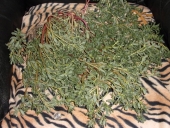




That is what I meant and I doubt anyone on here thought I meant otherwise.Walter Jeffries wrote:Pastured Pork fat. Not "pastured" where they are really being fed grain as their main diet but I mean really pastured.




If good health was all about getting your omega 3 level right then that would be great but you will probably end up with various deficiencies somewhere down the line. No offence but at age 51, I am beyond caring what young people have to say about nutrition. I have nothing against young people. I was young once. Young people do pretty well on just about anything so long as they don't overeat. Unfortunately for them they will become old too one day and what they could get away with when young, probably wont work when they get old.Ben B wrote:The problem with the Weston A Price philosophy is that it only shows a clear benefit when compared to the standard western diet. Weston Price, if you read his book, was never out to promote animal foods or to bash vegetarian diets. He was showing that processed foods are the main causes of tooth decay and overall disease in the body. Yes, special compounds in animals such as vitamin K2, carnitine, carnosine, DHA, EPA, etc all have benefits but these are all compounds that humans are SUPPOSED to be be producing themselves when eating a plant-based diet. Grass-fed meats, butter, and fish oil only shows a clear benefit when added to a diet deficient in the precursors of those nutrients OR a an abundance of junk clogging up the conversion process. In our case here of omega-3, feeding fish liver to a famished native living on rice and corn would improve their health dramatically. They weren't previously getting adequate nutrition for their body to synthesize all the nutrients that it needs. In addition, giving that same fish liver to a 40-year old overweight computer programmer would improve their health. The high amounts of arachadonic acid from animal products and polyunsaturated omega 6 from oils out-competed for the enzymes that convert short chain to long chain omega 3: desaturase and elongase. This causes an imbalance in fatty-acid profile and thus the need to supplement or eat animal foods. I'll admit, the omega-3 could be even life saving in both cases. I won't argue that.
But what about the third option? What about someone who has their body in good working order and follows a low-fat vegan diet high in fruits and vegetables. What's their omega-3 status like? Watch my my video and find out




Ben B wrote:low-fat vegan diet




Warren David wrote:
That is what I meant and I doubt anyone on here thought I meant otherwise.Walter Jeffries wrote:Pastured Pork fat. Not "pastured" where they are really being fed grain as their main diet but I mean really pastured.




Me too. The propaganda was pretty convincing and I felt fantastic for the first few days. Eventually my health started deteriorating though.Walter Jeffries wrote:
I've tried vegan, vegetarian, etc...Ben B wrote:low-fat vegan diet




Walter Jeffries wrote:Pastured Pork fat. Not "pastured" where they are really being fed grain as their main diet but I mean really pastured. When animals eat forages they store higher levels of omega-3 fatty acids in their fat. Same for fish (phyto-plankton) and cattle that are really on grass diets. We raise pastured pigs (it's our main thing at our farm) so we are doing lab research into the exact levels of Omega-3 fatty acids and other things and how they vary over the seasons.
Any animal that is eating lots of greens is likely to be a good source of the Omega-3 fatty acids.
"Limitation is the mother of good management", Michael Evanari
Location: Southwestern Oregon (Jackson County), Zone 7
 1
1








Conrad Zirkwitz wrote:Sea Buckthorn seed is high in omegas and has a 1:1 ratio of omega 3 to omega 6
 1
1




 2
2




Guy De Pompignac wrote:Hi,
i'm a bit concerned by the way to obtain omega-3 required by growing my own food
ALA : wallnuts are a good source (but i read that it contains to much Om6 in proportion). Flax, rapeseed, purslane too, but are annuals (and i'm lazy about annuals)
DHA : no veg sources (as far i know). Best converters are chicken throught their eggs. Flax feed chicken eggs (yellow part) have 2,2% of acid fats that are DHA. Cows via milk are not good converters *.
(flax enhanced eggs have also more ALA by ten folds)
EPA : hard to obtain !
- Wild Fish : best of non frigthned species are are (with g of EPA by 100g) : Mackerel (1,2g), Sardine (1,1g)
- Some can be obtained by flax-feed chicken eggs (but not much : 0.3% of fatty acid)*
- Fishes on farm : EPA can be enhanced with flax seed, but only with vegan fishes (eg carp) cause carnivore fishes are bad converters of veg ALA (for example trout feed with flax seeds have just a 5% increase in EPA *). But i assume trout can be feed with flex-enhanced fishes
have you some good infos about chicken/fish fodder wich contains ALA and are more permaculturish than flax ?
For example i discovered that elaeagnus angustifolia seed oil contains 12.2 % ALA, but i dont know if chicken eat those, and if so if they eat or poop the seeds ...
Also snails should enhance omage 3 acids content
(i'm also interested by numbers on flax enhanced fishes)
* Source in french : http://books.google.fr/books?id=Ftl5JYK6GYEC&pg=PA232&lpg=PA232&dq=omega+3+poules+lin&source=bl&ots=CrYmRscioo&sig=OOID8FgVneHNvlPTccGlTZFF85o&hl=fr&ei=w2YlTZ2gEcep8QOes7jZAg&sa=X&oi=book_result&ct=result&resnum=6&ved=0CEwQ6AEwBQ#v=onepage&q&f=true
 5
5




 2
2




Best luck: satisfaction
Greatest curse, greed
 4
4





|
Always respect your superiors. If you have any. - Mark Twain / tiny ad
Play Your Way to a Sustainable Lifestyle: Uncover Permaculture Principles with Each Card
https://gardener-gift.com/
|







